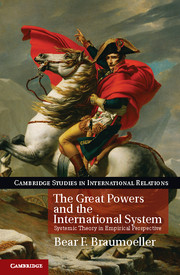Book contents
2 - System, state, and citizen
Published online by Cambridge University Press: 05 January 2013
Summary
Introduction
This chapter contains a description of the theory of nested politics that will serve as a framework for the analysis of Great Power security policy throughout the remaining chapters. The heart of the chapter is a description of how the actors (states and, through them, citizens) shape the international system and how the system in turn influences the behavior of the actors. The core explananda, or dependent variables, of the theory are the distributions that constitute the structure of the international system- balances of power, ideology, and so forth – on the one hand, and the overall level of the state's security-related activity – ranging from isolationist to normal (for a Great Power) to hyperactive or aggressive – on the other. By explaining their reciprocal relationship to one another, the fundamental dilemma regarding the ontological priority of agents vs. structures can be mitigated.
The theory is based on a formal mathematical model, the nested politics model, first described in Braumoeller (2008). Given that much of the political science discipline, and in particular much of it that is interested in systemic theory, does not consist of scholars with training in formal modeling, however, I have relegated the technical details to Appendix A and described the workings of the model, to the extent that it is possible to do so, in ordinary English.
The nested politics model is a model of the systemic mechanism that produces outcomes, rather than an argument that their actions will be prompted by particular motives. To paraphrase Wendt, international security is what states make of it, and what they make of it is, irreducibly, an empirical rather than a theoretical question. That is not to say that the nested politics model cannot be used to help resolve questions about actors’ motives or about paradigms in international relations. Far from it, in fact.
- Type
- Chapter
- Information
- The Great Powers and the International SystemSystemic Theory in Empirical Perspective, pp. 23 - 67Publisher: Cambridge University PressPrint publication year: 2013



